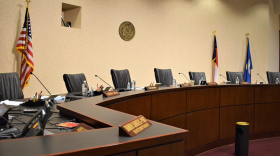Republicans in the N.C. House and Senate have struck a compromise on their competing Helene relief proposals, sending more than $1.5 billion to the beleaguered region.
The new deal does not include the small business grant program that the House included in its proposed relief package, an effort the Senate has maintained is unconstitutional.
Storm-damaged transportation infrastructure will receive about $270 million for repairs in the compromise, down from about $565 million in the Senate proposal.
The compromise accomplishes that in large part by not pulling funds from other transportation programs as the Senate proposed. Those include $100 million from a state program that helps large municipalities maintain their roads, $45 million from a bridge preservation program, $45 million from a pavement preservation program or $42 million from a rail crossing safety program.
Both the House and Senate agreed with the changes in overwhelming votes Thursday, sending House Bill 1012 to Governor Josh Stein.
Rep. Karl Gillespie, R-Macon, called the bill "a comprehensive response in our continued efforts to address Helene and the rebuilding of North Carolina."
On the Senate side, Sen. Ralph Hise, R-Mitchell, led negotiations. Hise thanked the Senate for its support of relief.
"It's exciting to me to even walk through my hometown and see the first restaurant is reopened in the first few weeks after the storm and nearly every building has some sort of construction or renovation going on as we try to continue to rebuild," Hise said.
The House sent the Senate its updated relief package in late May, and it didn't move for several weeks. Then, last week, Senate Democrats threatened to file a discharge petition in an effort to pull the bill out of committee onto the Senate floor.
Soon after that, the Senate re-assigned the Helene bill to its Base Budget Committee, which introduced its own proposal this week. The General Assembly was under some pressure, with long-standing plans to take a break until later in the summer.
Was this enough aid?
House Democrats from Buncombe County voted for the bill, but made clear that they strongly believed it had fallen short of the need.
Last September's storm caused nearly $60 billion in damage, according to a state assessment, and caused 108 deaths in North Carolina. There are still four people missing.
Rep. Brian Turner, D-Buncombe, said that Asheville's economy was devastated by the storm and has not yet recovered. And as Asheville's economy goes, Turner said, so goes the economy of the region.
There is a very real chance, Turner said, that future aid packages won't come soon enough to bolster the region's small businesses.
"For most of the small businesses that were impacted by the storm, it will come too late and the ripple effects will be felt across the whole region," Turner said. "So while this is part two, and it will help, it is not the help we need."
Senate Republicans have maintained that small business grants are unconstitutional and would need a constitutional amendment. To that end, Hise filed a bill Thursday afternoon seeking to place a constitutional amendment on the ballot allowing the state to make grants to small businesses after disasters.
Rep. Dean Arp, R-Union, noted that the relief package introduced Thursday allocates nearly $900 million of state funds and appropriates an additional $685 million of federal infrastructure funds. That comes on top, Arp said, of about $1.4 billion appropriated in previous relief packages.
"This is not the last bill. This is the next bill in the line, with significant funding. People are hurting. We're trying to provide that relief as we're able to do so," Arp said on the House floor.
Among other provisions, the new relief package includes:
- Allocating $685 million in water and wastewater treatment funds from the U.S. Environmental Protection Agency.
- $75 million to N.C. Emergency Management to help pay for privates roads and bridges.
- $70 million to help provide matching funds for FEMA programs.
- $25 million to the N.C. Department of Agriculture for a crop loss program.
- $18 million to volunteer organizations that are actively working on Helene Recovery
- $16 million to the Town of Canton, including $14 million to purchase the former Pactiv wastewater treatment facility and other nearby properties to build a new regional wastewater facility.
- $15 million to the N.C. Forest Service for new assets and personnel to help address wildfires.
- $10 million to the N.C. Department of Environmental Quality to address dam safety and rehabilitation.
- $5 million to the N.C. Department of Commerce to promote tourism in Western North Carolina.
The bill will now head to Gov. Josh Stein, who has 10 days to sign it into law, allow it to become law or veto it. Stein has consistently called for additional relief funds to help address impacts from last September's storm.







